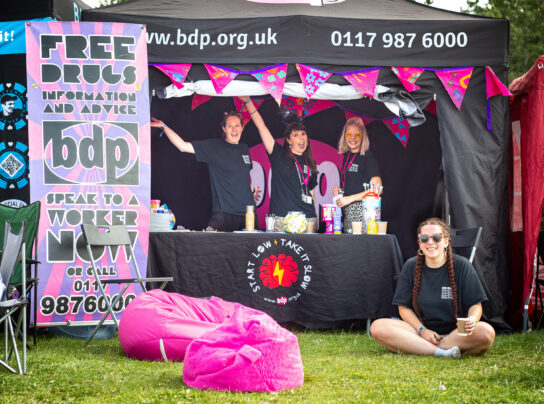18.11.20
5 minute read
At the beginning of November The Drop launched a harm reduction service at the University of Bristol. Students can access harm reduction information, advice and support on alcohol and other drugs and free reagent drug testing kits.
Reagent testing kits are chemicals that change colour when a drug is added. The colour change can then be compared to a reference table to work out if the sample is what it is supposed to be. Reagent testing kits are only able to detect the presence of a drug, not the quantity or purity. This blog will talk through some common questions people have about reagent testing.
There’s no denying that a certain level of skill is required to use reagent testing kits effectively but once you know what you’re doing, it will only take a minute or two. It’s important to use them safely, to understand what might happen if your drugs are a mix of substances and what to do if you don’t understand the results. It’s a good idea to have a practice on a substance that you know is what it’s supposed to be (eg. ibuprofen) so you can learn the process.
If there’s more than one substance in your drugs its possible for the colour change from one substance to mask the colour change of another, which could give you a false positive. If a sample is a mixture, you may also notice multiple colour changes concurrently or a ‘muddy’ result, both of which indicate contamination and the safest thing to do is to chuck your drugs away. Reagent tests aren’t fool proof so it’s vital to follow other harm reduction practices every time you use drugs, even if you’ve tested them.
Just because your dealer says they have the best stuff or their stuff always feels strong it doesn’t mean their drugs are legit. Dealers don’t generally test their substances or know the original source so there’s no way for them to guarantee that their supply is pure. It’s always worth testing your drugs, even if you think you can trust the source.
As always, the safest way to use drugs is not to use them at all. It’s really important that you follow harm reduction advice (dosage, interactions etc.) for your drug(s) of choice even when you’re fairly certain they’re what they’re supposed to be, particularly as reagents can’t test for purity or quantity. For example, if you test a pill you think is MDMA and a reagent test confirms this, you still won’t know if it contains 80mg of MDMA or 300mg so always start low and take it slow.
Being able to test drugs means people are more likely to realise if they get a bad batch, and are therefore more likely to dispose of harmful substances. When The Loop have tested drugs at festivals they found that 1 in 5 people disposed of their drugs once they had the result. A good comparison is providing sex education and contraception. These interventions haven’t caused an increase in people having sex, but they have reduced the incidence of STIs and unplanned pregnancies.
It’s great that people are getting more engaged in harm reduction and we really encourage you to continue following safer use guidelines. However, these guidelines usually relate to a particular substance so they aren’t completely water tight if your drugs are mis-sold. For example, a reagent kit is able to tell you if your MDMA is actually N-Ethylpentylone, a much more harmful substance that can be deadly at doses considered normal for MDMA.
Reagent testing kits are not the be all and end all of harm reduction but we think they are worth using, as long as you are aware of their limitations and they are delivered as a package alongside a tailored harm reduction intervention. That’s why we’ve decided that in our scheme, you will only be able to pick up a kit once you have spoken to one of our workers about what harm reduction practices could help keep you safe. You’ll also receive training in how to use the kits safely and what they can and cannot do. If you’ve got any questions about the scheme, or would like to sign up, please get in touch.
If you would like to know more about harm reduction, would like some support around your drug use or are concerned about a friend or family member, please get in touch on 07903799104, at thedrop@bdp.org.uk or on our socials @TheDrop_BDP.
18.11.20
5 minute read

The Drop
This festival season is set to be our busiest yet and we can’t wait! After the dreaded c-word cancelled all events in 2020...